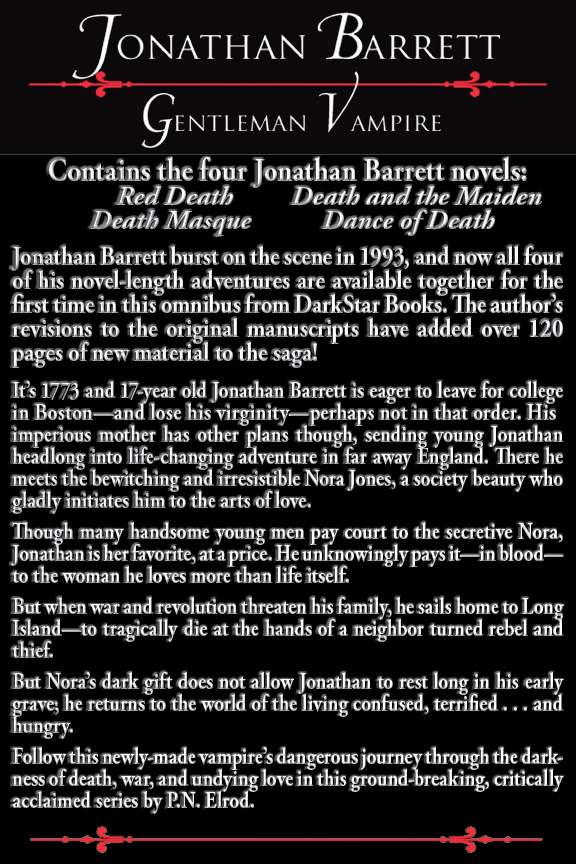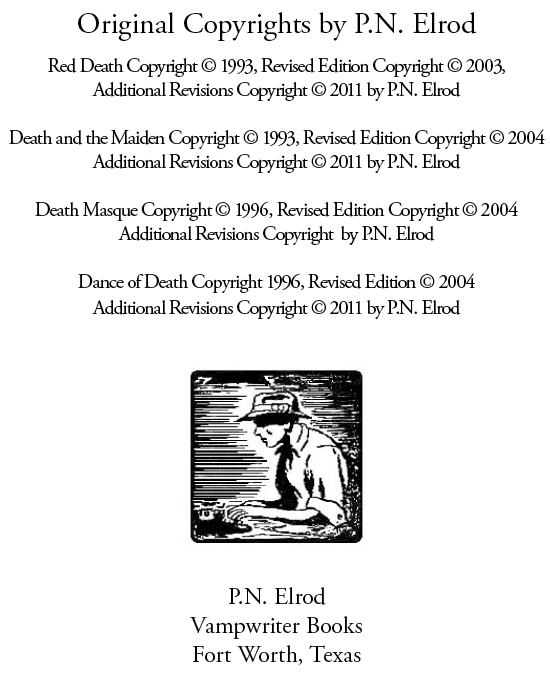Jonathan Barrett Gentleman Vampire
Read Jonathan Barrett Gentleman Vampire Online
Authors: P.N. Elrod







CHAPTER ONE

LONG ISLAND, APRIL, 1773
“You are a prideful, willful, ungrateful wretch!”
This was my mother speaking—or rather screeching—to me, her only son.
To be fair, it was not one of her better days, but she had very few of those, and it was difficult to discern any improvement in her temper at the best of times. Good or bad, it was wise to treat her with the unquestioning respect that she demanded, if not openly, then by implication. I had failed to observe that unspoken rule of behavior, and for the next few minutes was treated to a sneering, acid-filled lecture particularizing apparently numberless negative aspects of my character. Considering that until recently she’d spent fifteen of my seventeen years removed from my company, she had a surprisingly large store of knowledge to draw upon for her invective.
By the time she’d paused for breath I’d flushed red from head to foot and sweat stung under my arms and seeped along my flanks. I was breathing hard from the effort required to contain my own hot emotions.
“And don’t you dare glower at your mother like that, Jonathan Fonteyn,” she ordered.
What, then, am I to do
? I snarled back to her in my mind. And she’d used my middle name, which I hated, which was precisely why she’d used it. It was her maiden name, yet one more tie to her other than blood.
With a massive effort, I swallowed and tried to compose my face to more neutral lines. It helped to look down.
“I am sorry, Mother. I meant no offense. Please forgive me.” The words were forced and wooden, fooling no one. A show of submission was required at this point to prevent her from launching into another tirade.
Unhampered by the obligation of filial respect, the woman was free to glare at me for as long as she pleased. She had it down to an art. She also made no acknowledgment of what I’d just said, meaning that she had not accepted my apology. Such gracious gestures of forgiveness were reserved only for those times when a third party was present as a witness to her loving patience with a wayward son. We were alone in Father’s library now; not even a servant was within earshot of her honey-on-broken-glass voice.
I continued to study the floor until she moved herself to speak again. “I will hear no more of your nonsense, Jonathan. There’s many another young man who would gladly trade places with you.”
Find one
, I thought. I would cheerfully strike a bargain with him on this very spot.
“The arrangements have been made and cannot be unmade. You’ve no reason to find complaint with any of it.”
True, I had to admit that in spite of my anger. The opportunity was extraordinary, something I’d have eagerly jumped for had it been presented to me in any other manner, preferably as one adult to another. What was so objectionable was having everything arranged without my knowledge and sprung without warning and with no room for discussion.
I took a deep breath in the hope that it would steady me and tried to push the resentment away. The breath had to be let out slowly and silently, lest she interpret it as some sort of impertinence.
Finally raising my gaze, I said, “I am quite overwhelmed, Mother. This is rather unexpected.”
“I hardly think so,” she replied. “Your father and I long ago determined that you would go into law.”
Liar.
I
had decided that in the years she’d been living away from us in Philadelphia. If only she had stayed there.
“It is our fondest hope that you not only follow in his footsteps, but far surpass him in your success.”
My jaw clamped tight at the unmistakable sarcasm in her emphasis of certain words. This time my anger was on Father’s behalf, not for myself. How could she think
him
a failure?
“To do that, you must have the best education possible. Don’t think that this is a mere whim of ours. I—we—have studied the choices carefully over the years and determined that Harvard is simply not capable of delivering the best that is available. . . .”
Just after breakfast, she’d sent for me to come to her in the library. I was apprehensive, wondering what the trouble was this time. It was yet too early in the day for me to have done anything to offend her, unless she’d found something to criticize in the way I chewed my food. I’d not discounted it as a possibility.
As with most of our meals now, we’d eaten in uncomfortable silence, Mother at her long-empty spot at one end of the table, and my sister Elizabeth across from me in the middle. Father’s place at the head of the table was empty, as he was away on a business errand.
Such silence was new to this previously cheerful and talkative household. It settled upon us like a heavy scavenger bird with Mother’s return home. Elizabeth and I had learned that it was better to remain quiet indefinitely than to speak before spoken to lest we draw some disapproving sharpness from her.
The servants were not as lucky. Today one of the girls chanced to drop a spoon, and though no harm was done, she received a lengthy rebuke for her clumsiness that left her in tears. Elizabeth exchanged glances with me while Mother’s attention was distracted. It was going to be a bad day for everyone, then.
Somehow we got through one more meal under this threatening cloud. Weeks earlier, my sister and I had agreed to always finish eating and leave at the same time so that neither had to face such adversity alone. We did so again, asking permission to be excused and getting it, and had just made good our escape when one of the servants caught up to us and delivered the summons. I was to come to the library at seven of the clock precisely.
“Why couldn’t she have said something at the table?” I whispered to Elizabeth after the servant was gone. “Is speaking to me directly so difficult?”
“It’s her way of doing things, Jonathan,” she replied, but not in a manner to indicate approval. “Just agree with whatever she says and we’ll sort it out with Father later.”
“Do you know what she wants?” I felt justified in my worry. Mother was an expert at criticism. She could turn the smallest of errors—real or imagined—into a hanging offense.
“Heavens, it could be anything. You know how she is.”
“Unfortunately, yes. May I come see you afterward? I might need you to bind up my wounds.”
She burst into that radiant smile reserved only for me. “Yes, little brother. I’ll go look for some bandages immediately.”
I took myself away and knocked on the library door just as the mantle clock within struck seven. She could not criticize me for being too late or too early.
Mother had seated herself in the chair next to Father’s desk; it would have been overdoing things to actually take his chair. She was canny enough to avoid that. The idea was to suggest his invisible presence approving her every action and word. I was sharply aware of this and not at all fooled, but also not about to make mention of it. In the month since her return, I’d had to face her here alone on a dozen minor transgressions; this was starting out no differently than the others. I’d speculated that she’d noticed the new buckles on my shoes and was going to deliver a scorching opinion of their style and cost. The other lectures had been on a similar level of importance. I was glad to know that Elizabeth was standing by ready to soothe my burns when it was over.
Mother assumed the demeanor of royalty granting an anxiously awaited audience, studying some letter or other as I walked in, her wide skirts carefully arranged, the tilt of her head just so. She could not have been an actress, though, for she was much too obvious in her method and would have been hooted from the stage in a serious drama. Farce, perhaps. Yes, she would be perfect at farce, playing the role of the domineering dowager.
Marie Fonteyn Barrett had been beautiful once: slender, graceful, eyes as blue as an autumn sky, her skin milk white and milk soft. So she appeared in her portrait above the library fireplace. In the twenty years since its painting, the milk had curdled, the grace turned to stiff arrogance. The eyes were the same color, but had gone hard. Her hair was different. No more were the flowing black curls of a young bride; now it was piled high over her creased brow and thickly powdered. In the last month it had grown out and needed rearranging. Perhaps she would even wash it and begin afresh. I hoped for that. Her tense stabbings and jabbings at that awful pile of lard caked with rice flour with her ivory scratching stick got on my nerves.
The curtains were open and cold April sunshine, too immature for warmth, leached through the windows. The wood in the fireplace had not been lighted, so the room was chilly. Mother was a great believer in conserving household supplies unless it concerned her own comfort. The lack of fire gave me hope that our interview would be mercifully short.
“Jonathan,” she said, putting aside the paper in her hand. I recognized it as part of the normal litter on Father’s desk, something she’d merely grabbed up to use for show. Why was the woman so contrived in her deportment?
“Mother.” The word was still awkward on my lips.
She smiled with a benevolent satisfaction that raised my apprehensions higher. “Your father and I have wonderful news for you.”
If the news was so wonderful, why was Father not here to deliver it with her? “Indeed, Mother? Then I am anxious to hear it.”
“You will be very pleased to learn that you will be going to Cambridge for your university education.”
That was hardly news to me, but I put on something resembling good cheer. “Yes, I am very pleased. I have been looking forward to it all year.”
Her brows lowered and eyes narrowed with irritation. Perhaps I was not as pleased as had been expected.
“I shall do my absolute best at Harvard to make you and Father proud of me,” I added.
Now her mouth thinned. “You will be going to Cambridge, Jonathan.”
“Yes, Mother, I know. Harvard University is located in Cambridge.”
Fury, red-faced and frightening to look upon, suddenly distorted her features so she hardly seemed human. Somehow, I had said the wrong thing. I almost stepped backward. Almost. Her rages were common. We’d all seen this side of her many times and learned by trial and error how to avoid them, but this one mystified me. What had I said? Why was she—?
“You dare to mock me, Jonathan? You dare?”
I raised one hand in a calming gesture. “No, Mother, never.”
“You dare?” Her voice rose enough to break my ears, enough to reach the servants’ hall. They would know better than to come investigate the din.
“No, Mother. I swear to you, I am not mocking you. I sincerely apologize that I have given offense.” Such words came easily; she’d provided me ample opportunity for practice over the weeks. I finished off with a bow to emphasize my complete earnestness. Yet another occasion to study the floor.
Thank God that it worked. Straightening, I saw her color slowly return to normal and the lines in her face abruptly smooth out. This strange, swift recovery was more disturbing than her instant rage. Since her return, I’d quickly adjusted to the fact that she was not like other people, though the knowledge was no comfort during those times when her differences were acutely displayed.
Dominance established, she resumed where she’d left off, almost as though nothing had happened. “You are going to Cambridge, Jonathan. Cambridge in
England
, Jonathan.” She put a razor’s edge on each syllable as though to cut through my abysmal ignorance.
It took me some moments to understand, to sort out the mistake. I supposed that she’d been anticipating a torrent of enthusiasm and gratitude from me. Instead, my face fell and out popped the first words that came to mind, since I was long used to speaking it. “But I want to go to Harvard in—”
That’s when the next explosion came and she began calling me names.
You know the rest.
What was she saying now? Something about the virtues of Cambridge in England. I did not interrupt; it would have been pointless. She was not interested in any opinions I might possess. My initial objections had been burned away by the heat of her wild temper. To resurrect them again would only aggravate her more. As Elizabeth had reminded me, I could sort it out with Father later.
Did he know about this? I could not believe that he did, else he’d have spoken about it before leaving yesterday. It had ever been our plan that I should go to Harvard. Mother had waited until he was absent before breaking her news. Perhaps she thought I’d could be turned against Father’s plans. It was difficult to think while she talked on and on, pausing only to collect the occasional nodding agreement from me at appropriate points.
Why was she even concerned about my education after fifteen years of blithe neglect? Marie Fonteyn Barrett had been singularly uninterested in either of her children since we were very small. It was a mixed blessing for us; growing up without a mother had left a blank spot in our lives. On the other hand, what sort of broken monsters might we have been had she stayed with Father instead of moving to Philadelphia?
She’d made the long journey from there to our home on Long Island because of the turmoil in that city. With the rebels stirring things up at every opportunity, it had become too dangerous to remain, so she had written Father, and he, being a good and decent man, had said her house was there for her, the doors open. Her swift arrival soon after the receipt of her letter caused us to speculate that she had not waited for his reply.

